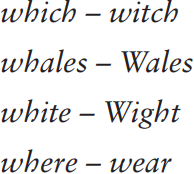
Did we lose the perfect tense already?
 المؤلف:
David Hornsby
المؤلف:
David Hornsby
 المصدر:
Linguistics A complete introduction
المصدر:
Linguistics A complete introduction
 الجزء والصفحة:
274-13
الجزء والصفحة:
274-13
 2024-01-03
2024-01-03
 2422
2422
Did we lose the perfect tense already?
Although the fine distinction between simple past and perfect tense has been lost from spoken French, it generally survives in English, but may be neutralized in favor of the simple past in some US English varieties, as in:
Did you eat yet?
I told him already!
Often greeted with bemusement by British English speakers, such sentences generally pass without comment in the United States.
The simple past (or ‘past historic’) forms on the left locate an action entirely in the past, while the perfect tense forms on the right signal that a past action has present relevance. In spoken French, only the perfect tense is used, so j’ai fait now means both ‘I did’ and ‘I have done’, and the subtle distinction between the two, generally retained in English, has been lost from the tense system. The decline of the past historic is best understood once again in terms of structural economy. A separate verb form serving to locate an action entirely in the past is redundant when this information is usually either clear from context, or indicated elsewhere in the sentence by means of a temporal adverbial adjunct, e.g.
je le fis hier (‘I did it yesterday’)
la guerre se termina en 1945 (‘The war ended in 1945’)
Furthermore, the past historic has a full paradigm of personal endings and numerous irregular stems (e.g. naître ‘to be born’; je naquis ‘I was born’), so its loss from the system represents a gain in structural economy on two counts.
The functional principle of increased economy can also explain certain changes to the phonological system as a whole. Languages show a strong tendency to eliminate phonemic oppositions with low functional load, i.e. those which affect few pairs of words. A good example from English is the /M/-/W/ opposition, which used to distinguish words beginning wh-from those beginning w-

Although the opposition is maintained in some areas, most English speakers now no longer use the /M/ phoneme. Reducing the number of phonemes in the inventory by one represents a gain in economy at relatively small cost: while some homonymic clashes do result, these are few in number and easily resolved in context (e.g. ‘Whales have been spotted off the coast of Wales’). The /W/-/M/ opposition, like that of the perfect and past historic tense in French, is a luxury the system can manage without.
 الاكثر قراءة في Syntax
الاكثر قراءة في Syntax
 اخر الاخبار
اخر الاخبار
اخبار العتبة العباسية المقدسة


